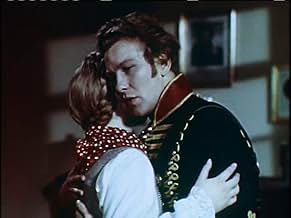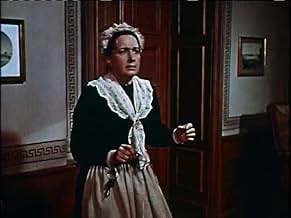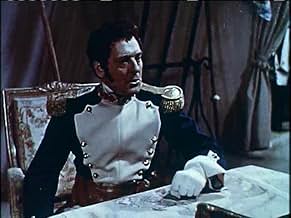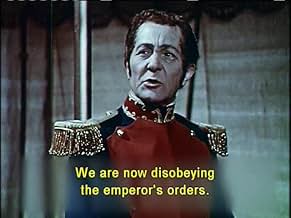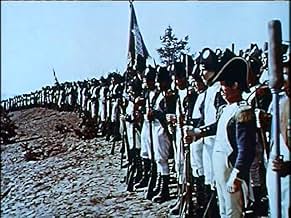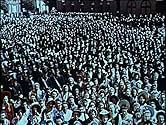अपनी भाषा में प्लॉट जोड़ेंDuring Napoleon's German campaign, the city of Kolberg is isolated from Prussian forces. Residents organize resistance against the French army besieging and bombarding the city, refusing to ... सभी पढ़ेंDuring Napoleon's German campaign, the city of Kolberg is isolated from Prussian forces. Residents organize resistance against the French army besieging and bombarding the city, refusing to surrender.During Napoleon's German campaign, the city of Kolberg is isolated from Prussian forces. Residents organize resistance against the French army besieging and bombarding the city, refusing to surrender.
- Zaufke
- (as H.H. Schaufuss)
- Fanselow
- (as F. Schafheitlin)
- französischer Offizier
- (as St. Germain)
फ़ीचर्ड समीक्षाएं
The film is set during the Napoleonic Wars--back around 1807. Town after Prussian town have surrendered to the oncoming French juggernaut. Yet, inexplicably, the town of Kolberg isn't ready to welcome the invaders. Despite a very weak commander of the Prussian army in the region, the Mayor isn't about to surrender and he's encouraging his people to fight to the death, as by slowing down the enemy, ultimate victory may result. But, he must contend with the wimpy commander and send a rather ordinary lady on a mission to have the King replace the commander and support the defense of the city. What follows are some exceptional battle scenes and the only ones which I have seen which are better are from the insanely large Russian version of "War and Peace" (a film you just have to see at least once in your life).
Overall, the film is very rousing and inspiring. It's obvious that the purpose of the film is to get the German people to be very willing to lay down their lives as well as convince them that this is not a sacrifice in vain (which is was). As a result, the film probably contributed to the unnecessary deaths of thousands of people--when there was no possible way to stop the inevitable. Plus, unlike the Prussians during the time of Napoleon, they were NOT fighting for what was right. Sad...but amazingly effective...provided the local movie houses had not been blown up so the folks could see it in the first place! By the way, the scene where the peasant girl meets the queen was exceptionally well done--even brilliant. See this and you'll understand what I mean.
Herr Goebbels mentioned that "Kolberg" was an attempt to one-up the Hollywood style and clearly, he's given his director, Veit Harlan, the financial and manpower resources to stage some big scenes. Or, at least, what I think were big scenes. Goebbels, worried that the sight of Prussian troops (the film is set during the Napoleonic wars) getting wounded and killed in battle might demoralize the flagging German spirits - the film was shot in 1944 - and thus cut most action sequences out of the film. You'll get an army charging a hill abruptly cut into a shot of a burning house(whose ignition is never seen) cut again into someone encouraging the dedicated Prussian citizenry to hold fast against the merciless French troops. Cut back to a charging army that never really engages with the enemy. Cut again to panicking villagers. In between these gaps, which become more egregious as the film progresses, you get hamfisted attempts at colorful local humor, an impossibly convulted plot that crosscuts between several German towns to no avail, and an overbearing Valkyrie peasant woman forever spurring her fellow subjects to the Higher Cause (she's the most sexless woman in movie history). Everything in the movie is impossibly crude to the hammer-on-anvil dialouge, to the declarative acting (each actor seems to be wearing his or her own Greek mask while at the same time failing to make any impression whatsoever), to the whole stilted and incoherent pacing of this film.
The film is terrible but fascinating, especially given the context of when and where it was made. Goebbels diverted troops from the eastern front for the battle scenes that he subsequently mutiliated. And when one learns that Goebbels considered this the film that would revive the Nazi cause and that it was filmed at the time and near the locations where the Final Solution was shifting into high gear, it leaves you with a strong feeling of disgust for the whole enterprise. Even the subject matter, about Kolberg's citizens futilely defending themselves against a French onslaught, seems out of place. The tale is obviously used to rally support for the flailing German cause but the Kolberg citizenry's efforts were lost (the Prussian army was vanquished) and thus the message of the film is cancelled out. In an even greater historical irony, by the time the film debuted (30 January 1945), the Pomeranian town of Kolberg had been taken over by the Russians and today is a part of Poland.
"Kolberg" is a unique document showing a well-oiled propaganda machine collapsing in the face of its immanent demise. It achieves the opposite of its intent. The stolid face at the end of the film with the proto-Nazi flag as a backdrop is supposed to convey a sense of determined conviction but there's fear in those eyes.
The film is an awesome piece of spectacle especially when you consider the money spent and the manpower appropriated from the battlefield by Dr. Goebbels to be extras, playing being French and Prussian soldiers for the camera and missing the real war where doubtless a lot of them would be killed. I wouldn't be surprised if a lot of candles were lit for Goebbels in many German households today because of it.
The story is after Austerlitz Napoleon pretty much had the run of things in Europe for a while. In his march toward Russia he met this incredible resistance from the former Hanseatic League town of Kolberg. Inspired by its mayor played by Heinrich George and Horst Caspar as General Gneissenau the place held out against incredible odds until the Treaty of Tilsit was signed, one of the few places in the future united Germany to do so. A whole lot like the way the City of Leningrad held out for years against the Nazis invading though that was a comparison the Third Reich would not be making.
George who was a favorite and favored player during the Third Reich is brilliant as Mayor Joachim Nettelbrick who spent as much time battling with Paul Wegener as the first commandant of the garrison as with the French. I had to think about that one for a bit, but it occurred to me that Hitler would probably have liked the citizen mayor showing up the professional army man as George continually does. After he was just a corporal and had conquered most of Europe against the advice of most of his generals. Of course then Gneissenau who is an ideal Aryan teams up with the mayor and they triumph.
The battle scenes populated with extras who were thanking whatever Gods they worshiped that they were not in the real war only miles away are staged brilliantly. The message of Kolberg is resistance and none of the other Nazi prejudices made its way into the film.
Veit Harlan one of the Third Reich's favored directors brought this one in which in Hollywood would have had the studio bean counters tearing the hair out of their heads. Krista Soderbaum who was the symbol of blond Aryan womanhood and Harlan's wife is also in the film who sustains several tragic losses, but carries on.
In a booklet that accompanied the DVD of Kolberg I ordered it pointed out the film did not have quite the impact that Goebbels thought it would after its Berlin premiere on January 30, 1945. First of all it had limited bookings because 90% of the theaters in Germany had been destroyed by Allied bombings. And by the time it came out the people were really not responding too well to the Propaganda Ministry's pablum.
I have to say that this last film from Goebbels is brilliantly conceived and executed. But after World War II Kolberg became and remains part of Poland with its German population expelled or worse by the Russian Army and Polish resistance. So what was it all about?
क्या आपको पता है
- ट्रिवियाFeatured 15,000 to 20,000 actual German troops in the battle scenes, even as Germany's eastern and western fronts were collapsing. The director tried to make the shooting longer to save them from being sent to the front.
- गूफ़Saxony didn't separate itself from the Holy Roman Empire. It was separated after the Rheinbund was founded in 1806, to which Saxony was included later. Also, in the movie the inclusion of Saxony is mentioned by King Franz II. In real life it didn't happen until December, almost four months after Franz's resignation.
- भाव
Bürgermeister Nettelbeck: [after Gneisenau asks Nettelbeck to surrender] You weren't born in Kolberg, Gneisenau. You are put here to Kolberg. But we grew up here. We know every stone, every corner every house here. We don't let go. Even if we have to claw in the ground of our city with our nails, we don't let go. First they have to cut off each of our hands or kill us one after the other. Gneisenau, you can't put the whole disgrace on an old man like me. and to give our city to Napoleon. I even promised our king: rather be buried below the ruins that capitulate. Gneisenau, Gneisenau, I never stand on my knees for anyone, now i'm doing it: Kolberg can't be given up, Gneisenau!
Gen. Gneisenau: That's what I wanted to hear from you, Nettelbeck. Now we can die together.
- कनेक्शनEdited into Der 30. Januar 1945 (1965)
- साउंडट्रैकEin Volk steht auf
टॉप पसंद
- How long is Burning Hearts?Alexa द्वारा संचालित
विवरण
बॉक्स ऑफ़िस
- बजट
- DEM 88,00,000(अनुमानित)
- चलने की अवधि
- 1 घं 51 मि(111 min)
- ध्वनि मिश्रण
- पक्ष अनुपात
- 1.37 : 1

